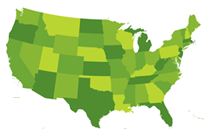After more than a month of silence on marijuana legalization, President Barack Obama finally addressed the issue last week in an interview with ABC News.
Obama said that going after recreational cannabis users in Colorado and Washington would not be a top priority for the federal government, adding that he has asked the Department of Justice to examine the issue from a legal perspective.
Let the parsing of words begin.
Most cannabis professionals were encouraged by the president’s comments, and some even said it clears the way for marijuana businesses in states that have legalized cannabis.
However, the president was quite vague: Obama did not specifically mention the business side of the equation or offer up any guidance for the two states that have legalized marijuana. And his statements sound eerily familiar to the ones he made on medical cannabis before launching a crackdown on the industry. At the same time, the federal government has never made going after individual marijuana users a “top priority.” It tends to primarily target large-scale drug dealers and growers, not the guys with a couple plants in their basements.
So one could argue that Obama didn’t really say much of anything. And some observers have made that point, arguing that the president provided no clarity and could still attempt to block all or parts of the laws from taking effect.
But there are several notable aspects of his comments that should be highlighted:
1. By saying nothing, Obama might actually be saying something. Put it this way: He could have come out against legalization or the business side of the industry, saying that he would fight it tooth and nail (like Mitt Romney did earlier this year). Or that the government would not tolerate retail marijuana shops. Or that he has serious concerns about these new laws. Given that he did not take an aggressive posture, you could reasonably argue that we will not see a worst-case scenario where the government tries to block the laws at all costs.
2. The president indicated that we need to engage in a conversation about how to “reconcile a federal law that still says marijuana is a federal offense and state laws that say that it’s legal.” Again, this is noteworthy for what he did not say. Obama did not evoke the supremacy clause or doctrine of pre-emption to emphasize that federal laws trump state ones. Instead, he indicated that he would work to find a middle ground.
3. In the past, Obama has dismissed marijuana legalization and taken a condescending tone when talking about it. Not so this time. He actually took the issue seriously (which he should have done long ago), and it’s clear that he is giving it some deep thought (which he must).
4. Obama said Congress has “not yet” changed the law, that he doesn’t support widespread marijuana legalization “at this point” and that federal law “still” says marijuana is illegal. This type of language could indicate that he thinks all three of these areas might change in the future. Without those qualifiers, his comments would read much differently.
Of course, this could be reading into it way too much. Perhaps Obama wasn’t trying to send any subtle messages at all, and maybe we should just take his comments at face value. But considering the importance of the issue at hand – and how little information we have to go on – it makes sense to peel back the layers of his comments to make a reasonable guess at what’s to come.
The federal government will have to determine its strategy fairly quickly. As we wrote about last week, more than a dozen states could consider marijuana legalization next year. This issue isn’t going away, and it’s pretty much a given that other parts of the country will move in this direction in the years to come.
Other top stories in MMJ Business Daily last week:



